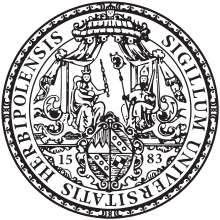 201-300
201-300 


Julius Maximilian University of Würzburg (JMU), founded in 1402, is one of the oldest German universities with a long tradition in research and teaching excellence. It is currently home of more than 400 professors and almost 28 000 students. Würzburg is a city encircled by vineyards, nestled in a curve of the river Main. Its 1300 year history draws hundreds of thousands of tourists each year, all captivated by the rich cultural heritage and beautiful landscape. Our university is deeply rooted in the region, but at the same time our research and teaching activities have led to achievements of global significance. 14 Nobel Laureates as well as many other eminent scholars and scientists, among them Wilhelm Conrad Röntgen, who discovered the X-rays in 1895, have researched and taught in Würzburg. Harald zur Hausen received the Nobel Prize in Medicine in 2008 for discovering that viruses trigger cervical cancer. The university offers more than 100 subjects in ten different faculties, comprising the humanities, law and economics, social and natural sciences, life sciences, medicine and selected areas of engineering. We are committed to continuing excellence in research and teaching across all branches of science. In addition to the ‘classic’ subjects, the university also offers many new degree programmes. The most recent ones are Nanostructure Technology, Functional Materials, Biomedicine, Modern China, Digital Humanities, Media Communications, Human Factors in Computing Systems and Museology – to name but a few. We prepare our students for careers in a wide range of fields. In this context, we closely coordinate our teaching with our current research activities and regard the promotion of junior academics as an essential responsibility. The establishment of several Graduate Schools in 2004 constituted a milestone in this endeavour. Moreover, as early as in the 1990s, the University of Würzburg began founding cross-faculty research centres, opening up new research fields and possibilities for innovative degree programmes. These interdisciplinary centres have become an internationally prominent trademark of the University of Würzburg and show our commitment to strengthening interdisciplinary research and cooperation. Gaining insights into all scientific disciplines and sharing these with students, research professionals and the general public is what JMU considers one of its main tasks. We are convinced that we must never forget our responsibility towards society. Thus we strive to make a contribution to fostering academic freedom, intercultural exchange and the generation of new knowledge by means of partnerships with universities from all over the world.
 201-300
201-300 
| Subject | Rank |
|---|---|
Medical Technology | 51-75 |
Biological Sciences | 76-100 |
Communication | 101-150 |
Ecology | 151-200 |
Biomedical Engineering | 151-200 |
Human Biological Sciences | 151-200 |
Clinical Medicine | 151-200 |
Dentistry & Oral Sciences | 151-200 |
| Undergraduate Programs |
|---|
Ancient Near Eastern Philology |
Ancient Near Eastern Studies |
Anglistics / American |
Biochemistry |
Biology |
Biomedicine |
Business Administration |
Business Integration |
Business Management |
Chemistry |
Computational Mathematics |
Digital Humanities |
Education For Special Educational Needs |
Education For Special Educational Needs |
Education Sciences |
Egyptology |
Ethnomusicology / Transcultural Music Studies |
European Ethnology / Cultural Anthropology |
Evangelical Theology |
Focus Chemistry |
Old World |
Protestant Religious Education |
| Graduate Programs |
|---|
Ancient Near Eastern Studies |
Anglistics / American |
Applied Human Geography |
Applied Human Geography |
Applied Physical Geography, Geosystemwandel and Protection |
Biochemistry |
Biology |
Biomedicine |
Business Administration |
Business Integration |
Business Management |
Chinese Studies |
Computational Mathematics |
Didactics of A Subject Group of Secondary School |
Economics |
Education Sciences |
Egyptology |
Ethnomusicology / Transcultural Music Studies |
European Ethnology / Cultural Anthropology |
European Law / Business Law |
Experimental Medicine |
Focus Life Sciences |
Focus Pharmacy |
Focus Physics |
Focus Physics Nanostructure Technology |